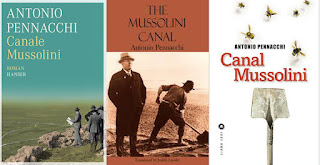Here you won't find the pages of a pedantic journal, praises to fantastic places or accounts of memorable encounters. This is a collection of stories, thoughts, images, and most of all odd stuff, even though to someone else it might actually look ordinary. To discern its bizarre side, in fact, special filters are needed: cynicism, fussiness, stubbornness, isolation, impudence, nosiness and nerdiness. All flaws that, in different measure, this semi-nomadic being has got embedded in his genes.
Monday, January 30, 2023
Mazzini - Denis Mack Smith
If there is a person that every Italian should be proud of, that person, in my humble opinion, is Giuseppe Mazzini. He probably deserves that gratitude even more than Giuseppe Garibaldi, another protagonist of the Italian Risorgimento (the 19th century Italian struggle for independence). Even though the famous general - due to his action hero aura - was arguably more famous than the Genoan ideologue, he has had a less far reaching influence on Italian culture and political education. Camillo Benso, count of Cavour, the third main character of that famous era, a very skilled politician and tactician indeed, can’t even compete with Mazzini as far as moral, philosophical and literary standing is concerned.
Monday, January 23, 2023
凍りついた香り Kōritsuita kaori (Italian: Profumo di Ghiaccio) - Ogawa Yoko
I don’t think there is an English translation of this book. At least I couldn’t find one, even searching the web. That’s why I’m mentioning the Italian title next to the Japanese one. If there really isn’t a translation of this novel in the most important language in the world, well, that’s a pity. This story is a good example of the peculiar Japanese fondness for details, surgical change of pace, tactfulness, delicacy and melancholy. Even of their atavistic tendency for seppuku or harakiri.
Tuesday, January 17, 2023
The Mussolini canal (Canale Mussolini) - Antonio Pennacchi
Besides being an excellent read, this is also a very good summary of twentieth century Italian history: the rural society at the turn of the century, the First World War, the socialist uprising, the birth of fascism, Mussolini’s takeover, the Second World War, the post war reconstruction and the ensuing economic growth. These events are all part of a story which revolves around a family - the Peruzzi - from the Veneto (that’s actually where I come from). They are sharecroppers, people who - for generations - have worked the land and farmed animals, gone to war, brought up dozens of children, eaten meager meals and made up for that by drinking barrels of wine, coped with natural disasters and famines, economic crises, pandemics, political instability and social abuse, who have fallen in and out of love, made friends and enemies, fought family vendettas and formed strong social bonds.
Friday, January 13, 2023
Inshallah (Insciallah) - Oriana Fallaci
A novel based in Beirut, Lebanon, during the 1982-84 Italian army peacekeeping mission to the Middle Eastern country.
The Israeli army has recently invaded the country and ousted the Palestinian fighters. Along with American, French and a few British soldiers, Italian sailors, paratroopers and Bersaglieri are patrolling the sensitive areas in and around Sabra and Shatila, where a few months earlier bands of Maronite phalangists had carried out a terrible massacre.
Tuesday, January 10, 2023
The diving pool - Ogawa Yoko
This is a collection of three short stories, novellas actually. Each story has a young woman as the main character. The first one is watching closely her childbearing older sister, the second one is visiting the boarding house where she used to live as a student - now almost empty - and the third one is experiencing a life crisis at the orphanage managed by her parents, where she also grew up.
Wednesday, January 4, 2023
Istanbul: memories and the city - Orhan Pamuk
I’ve seen this book on the same shelf of my parent’s house bookcase for a few years. I thought it was a novel, I don’t know why. When I finally picked it up I found out that it is actually a collection of memoirs. Every chapter deals with a different topic. Sometimes it’s an area of the city, sometimes a person, a building, a situation, a life phase. This work doesn’t feature a proper narrative thread. It is rather a set of recurring themes - mostly sensations - that keeps together not only the pages of the book, but - the author feels - also the city and the people who live in it.
Istanbul - aka Byzantium or Constantinople - and its inhabitants are torn between the desire for modernization and westernization on one hand, and the melancholy and longing for a glorious past which is no more on the other: poverty, mess and filth are always there to remind one of the reality of that loss.






